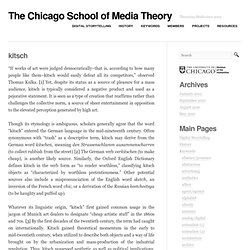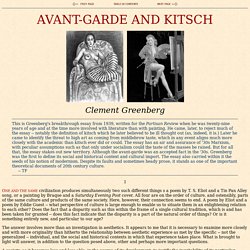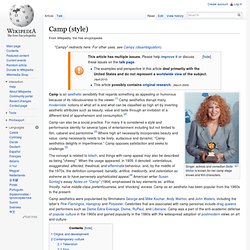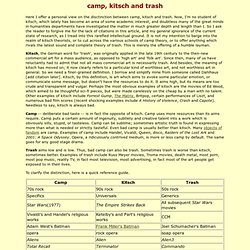

The Chicago School of Media Theory. “If works of art were judged democratically–that is, according to how many people like them–kitsch would easily defeat all its competitors,” observed Thomas Kulka. [1] Yet, despite its status as a source of pleasure for a mass audience, kitsch is typically considered a negative product and used as a pejorative statement.

It is seen as a type of creation that reaffirms rather than challenges the collective norm, a source of sheer entertainment in opposition to the elevated perception generated by high art. Though its etymology is ambiguous, scholars generally agree that the word “kitsch” entered the German language in the mid-nineteenth century. Often synonymous with “trash” as a descriptive term, kitsch may derive from the German word kitschen, meaning den Strassenschlamm ausammenscharren (to collect rubbish from the street) [2] The German verb verkitschen (to make cheap), is another likely source. High Camp Super Heroes. Introduction to Kitsch: History, Theory, Practice. Kitsch: Key Word Inspection of Popular Culture-Research-Degree-Thesis.
Photo With Kim Jong Il and Bill Clinton Tied to Journalists’ Release Spotlights Dictator Kitsch. Greenberg: Avant-Gardde and Kitsch. Clement Greenberg This is Greenberg's breakthrough essay from 1939, written for the Partisan Review when he was twenty-nine years of age and at the time more involved with literature than with painting.

He came, later, to reject much of the essay -- notably the definition of kitsch which he later believed to be ill thought out (as, indeed, it is.) Later he came to identify the threat to high art as coming from middlebrow taste, which in any event aligns much more closely with the academic than kitsch ever did or could. The essay has an air and assurance of '30s Marxism, with peculiar assumptions such as that only under socialism could the taste of the masses be raised. But for all that, the essay stakes out new territory. ONE AND THE SAME civilization produces simultaneously two such different things s a poem by T. The answer involves more than an investigation in aesthetics. The Trouble with Perfection: Kitsch and its Vicissitudes (M.Phil Thesis) Kitsch per se.

Rather, the wrongness of kitsch is that it undermines one’s abilityto relate to the wider world in an affirmative manner. This wrongness is ethicalrather than aesthetic.Before we begin this discussion, let me clarify some assumptions. Kic i sund. Www.diplomski-rad.com/images/stories/seminarski-diplomski-rad/2765-Sociologija-Kic-i-sund-SRB-15str.pdf. Camp (style) Singer, actress and comedian Bette Midler is known for her camp stage shows and film characters.

Camp is an aesthetic sensibility that regards something as appealing or humorous because of its ridiculousness to the viewer.[1] Camp aesthetics disrupt many modernists’ notions of what art is and what can be classified as high art by inverting aesthetic attributes such as beauty, value and taste through an invitation of a different kind of apprehension and consumption.[2] Camp can also be a social practice. For many it is considered a style and performance identity for several types of entertainment including but not limited to film, cabaret and pantomime.[3] Where high art necessarily incorporates beauty and value, camp necessarily needs to be lively, audacious and dynamic. “Camp aesthetics delights in impertinence.” Camp opposes satisfaction and seeks to challenge [2] Susan Sontag: Notes On "Camp" Published in 1964. Many things in the world have not been named; and many things, even if they have been named, have never been described. One of these is the sensibility -- unmistakably modern, a variant of sophistication but hardly identical with it -- that goes by the cult name of "Camp.
" A sensibility (as distinct from an idea) is one of the hardest things to talk about; but there are special reasons why Camp, in particular, has never been discussed. It is not a natural mode of sensibility, if there be any such. Indeed the essence of Camp is its love of the unnatural: of artifice and exaggeration. Though I am speaking about sensibility only -- and about a sensibility that, among other things, converts the serious into the frivolous -- these are grave matters.
Taste has no system and no proofs. To snare a sensibility in words, especially one that is alive and powerful,1 one must be tentative and nimble. These notes are for Oscar Wilde. 1. 2. 3. 4. 5. 6. 7. 8. Što i tko je kemp? Život - Pop Intelligence - Od kiča do Campa. Termin kemp je sam po sebi fluidan i eluzivan.

Često se i način njegovog pisanja dovodi u pitanje. To i tko je Camp? Camp, Kitsch, Trash. Here I offer a personal view on the disctinction between camp, kitsch and trash.

Now, I'm no student of kitsch, which lately has become an area of some academic interest, and doubtless many of the great minds in humanities departments have investigated the matter in much greater depth and length than I. So I ask the reader to forgive me for the lack of citations in this article, and my general ignorance of the current state of research, as I tread into this rarefied intellectual ground. It is not my intention to barge into the realm of kitsch theorists, or to cut across the various schools of camp theory, or to offer anything which rivals the latest sound and complete theory of trash. This is merely the offering of a humble layman. Kitsch, the German word for 'trash', was originally applied in the late 19th century to the then-new commercial art for a mass audience, as opposed to 'high art' and 'folk art'.
KIČ. KRITIKA 26: Sanja Muzaferija — booksa.hr. KRITIKA 26: Sanja Muzaferija 'Od kiča do Campa' važna je i na ovim prostorima rijetka studija pop-fenomena koji iz domene popularnog ulaze u sferu politike.

Kemp, glagol i glagolska imenica, pojam neprevodiv u srpsko-hrvatsko-bosanskom jeziku, na kulturnoj mapi Srbije ostao je potpuno nevidljiv sve do 2002. kada je preveden esej Suzan Zontag (Susan Sontag) Beleške o kempu/Notes on ’Camp’ (iz 1964.), i 2003. kada je prevedeno delo Filipa Kora (Philip Core) Kemp – Laž koja govori istinu/Camp – Lie That Tells the Truth. Camp, Kitsch, Trash.